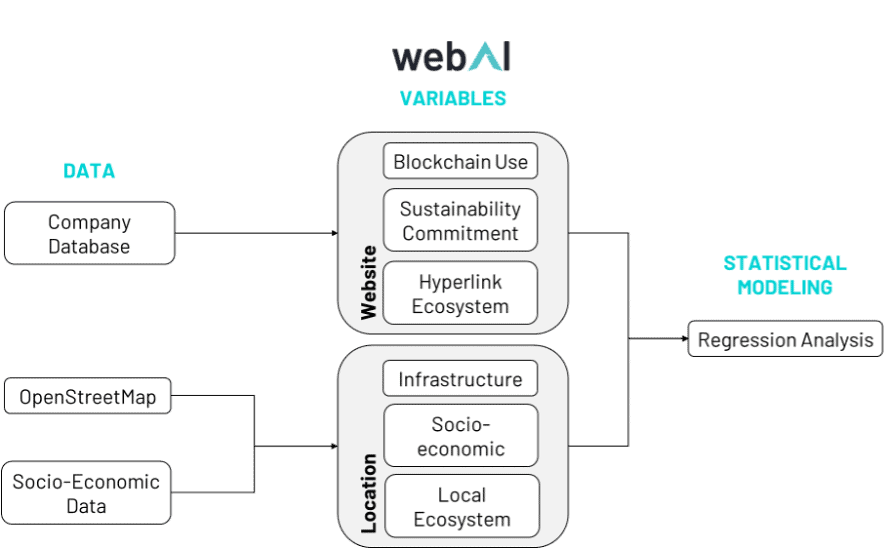Location analysis of sustainable blockchain companies in the US
Sebastian Schmidt & Jan Kinne
ISTARI.AI conducted the first comprehensive analysis of the use of blockchain technology in a sustainability context
08. February 2023
Digital technologies are becoming more and more important in our world. One technology that, according to experts, could be a real game changer is blockchain. It is a decentralised, digital ledger consisting of records (“blocks”) that is used to carry out transactions. It is important to note that the blocks used cannot be changed retroactively. Due to its transparency, the technology is used, for example, in organisation management, for payment processes or supply chain management. The best-known applications are cryptocurrencies (e.g. Bitcoin) or non-fungible tokens (NFTs). However, due to the high energy consumption of some blockchain implementations (especially the ones relying on the proof-of-work concept), the technology is criticised with regard to its sustainability.
In collaboration with researchers from the Technical University of Munich, the University of Mannheim, ZEW Mannheim and Harvard University, ISTARI.AI conducted the first comprehensive analysis of the use of blockchain technology in a sustainability context. In our study, we used webAI to analyse US-based companies that have blockchain technology integrated in their products and services and also present themselves as engaged in sustainability related activities on their websites. We were particularly interested in location factors that stimulate the use of blockchain technology in a sustainable context. For this, we used webAI to gather information on infrastructural location factors from OpenStreetMap, socio-demographic variables and company networks derived from hyperlinks. In total, we examined 3.72 million companies in the USA. Our study design is shown schematically below.

Figure: Study design.
Our approach allows us to evaluate in detail each blockchain company location in the US. Below you can see an example zoom map of the city of Boston in Massachusetts:

Figure: Zoom map of sustainable blockchain firms in Boston, MA.
We found that blockchain is still a niche technology with only about 22,500 companies in the USA reporting its use, which is about 0.6% of the analysed firm population. According to webAI Sustainability, 32.1% of these companies present themselves as engaged in sustainability, which is significantly higher than the average for all companies (19.9%). Based on the results of webAI, we can map the geographic distribution of blockchain companies in the U.S. (see below). The U.S. counties with the highest relative shares of blockchain companies in the overall company population are San Francisco, CA; Santa Clara, CA and New York, NY.

Figure: Relative distribution of blockchain firms on county level.
Using a regression analysis, we then examined the relationship between the measured location factors and the sustainability status of blockchain companies. The results showed that the ecosystem embedding of blockchain companies in particular plays a central role: Especially blockchain companies that have many and also sustainable partners are often sustainable themselves. The co-location of sustainable companies in the direct neighborhood (1 km) also appears to be conducive. Infrastructural and socio-economic location factors on the other hand, do not seem to have much significance.
Based on our study results, policy makers would thus be advised to particularly promote the networking of blockchain companies to sustainable companies. Contact with these potential cooperation partners, customers or competitors seems to promote the use of blockchain technology in a sustainable context. We at ISTARI.AI can provide concise information on the topic of blockchain for firms in Europa and the USA.
You can find more information about our project in the following video (Presentation of Jan Kinne at the Centre for Geographic Analysis at Harvard University).
Paper: Kinne, J., Dehghan, R., Schmidt, S., Lenz, D. & Hottenrott, H. (2023): “Location factors and ecosystem embedding of sustainability engaged blockchain companies in the US.“ (currently under review)
Interested in the data that was used in this case study?
Just book a free demo.
